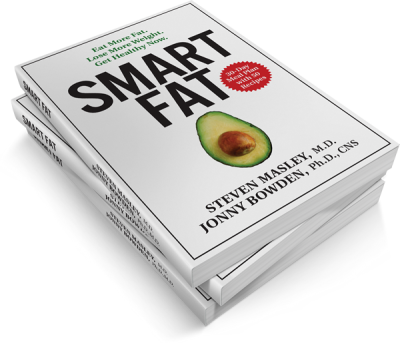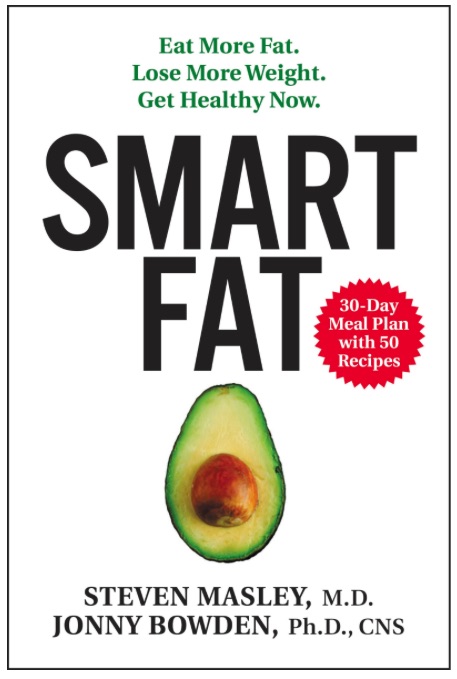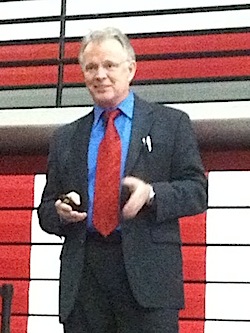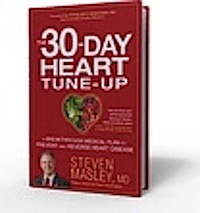
Feb. 9, 2016, Vol.14, Issue 2
Happy Heart Health Month!
The Internet has made it easy to find information — and it’s often overwhelming, especially when it comes to the latest and greatest diet and nutrition “help.” There’s so much hoopla and promotion out there — at least in my  Inbox — that I exercise a lot of skepticism and precaution when it comes to giving it my time. That is especially true when it’s a headline that turns previously accepted norms, upside down.
Inbox — that I exercise a lot of skepticism and precaution when it comes to giving it my time. That is especially true when it’s a headline that turns previously accepted norms, upside down.
Sometimes, however, my curiosity wins, and that was the case, when I started seeing news that “fat is good for you,” and looked closer at Dr. Steven Masley’s newest book, Smart Fat: Eat More Fat. Lose More Weight. Get Healthy Now, co-authored with Jonny Bowden, PhD, CNS.
Dr. Masley holds a unique position in both the medical and the dietary worlds; during his training in cardiac health in Olympia, Washington, he observed that eating influenced overall health in general and heart health in particular; so he also interned in a 4-star restaurant in Seattle to learn how to make healthy food taste delicious. He’s a recognized expert in both fields as well as a gifted speaker. I still remember his illustrations of plaque build-up and the true causes of heart attacks from the last time I heard him speak.
It takes a lot of solid rationale to get my attention, and that’s what I found in this article that he wrote about smart fats. In celebration of heart health month, I share this article and trust that you, too, will find it enlightening.
Smart Fats for a Healthy Heart
For years the medical community has told people to decrease their fat intake to prevent heart disease, but there have been three big problems with this approach.
First, it is hard to do. I spent years telling people to lower their fat intake, yet 95% of my own patients couldn’t do it. They weren’t satisfied, they developed cravings, and they couldn’t stick with it.
Second, I believe the benefits from low fat diets (like Pritikin, Esselstyn, and Ornish) has  little to do with eating low-fat. Sure, they do get rid of some bad fat, which is good, but the real reason these eating plans are better than the SAD (Standard American Diet) is when they’re done right, they’re packed with fiber and they’re high in plant-based nutrients.
little to do with eating low-fat. Sure, they do get rid of some bad fat, which is good, but the real reason these eating plans are better than the SAD (Standard American Diet) is when they’re done right, they’re packed with fiber and they’re high in plant-based nutrients.
Third, although the low-fat diets do some things right, like getting rid of bad fats, they also get rid of smart fats – and that is actually pretty dumb. Smart fats have two BIG amazing benefits. They decrease inflammation and they improve hormone levels, in particular blood sugar and insulin. So when we cut out the Smart Fats, we become more inflamed and lose healthy hormone balance too. And as the leading causes for heart disease are high blood sugar levels and inflammation, cutting out smart fats increases the risk for arterial plaque growth.
This does not mean eating more of any fat is good, (I am not saying that you should eat more ice cream, sausage, and French fries) but only add more fat if it is smart fat. So, what do I mean by smart fat?
What is Smart Fat?
Smart fats have proven clinical benefits from published studies. For example, studies have shown that consuming more olive oil and nuts decreases the risk for cardiovascular disease. Hundreds of other studies suggest nuts and olive oil are good for your heart and help to slow overall aging. Wild salmon and sources of fish oil have proven heart benefits, plus they decrease inflammation and they are good for our brain. Dark chocolate, another smart fat, has been shown to have many benefits for blood pressure, overall cardiovascular health, and is also good for the brain. Monounsaturated food sources, like avocado, have been shown both to improve our cholesterol profile and to help with insulin resistance.
So, nuts and nut oils, olive oil, cold water fish, dark chocolate, and avocado are clearly good for your heart and health, and can easily be called smart fats. Smart nuts with proven benefits include: almonds, pecans, walnuts, pistachios, hazelnuts, and macadamias.
What is Bad Fat?
There are obvious examples of bad fats, such as partially hydrogenated fats (also called trans fats) that worsen cholesterol profiles and blood sugar control, and increase cancer risk. Hydrogenated fats are used by the food industry to extend the shelf life of food, but they shorten your life if you eat them.
Another example of bad fats are fats loaded with pesticides and hormones. Feedlots too often feed cows, pigs, and poultry pesticide-packed grain whose chemicals accumulate in the fat. When we eat the animal fat, we may get a big load of toxic fat. Feedlots may also load animals with growth hormones, and these hormones likely increase your risk for cancer.
pesticides and hormones. Feedlots too often feed cows, pigs, and poultry pesticide-packed grain whose chemicals accumulate in the fat. When we eat the animal fat, we may get a big load of toxic fat. Feedlots may also load animals with growth hormones, and these hormones likely increase your risk for cancer.
So, to avoid bad fats, become a savvy shopper – read labels, and if you purchase meat and dairy, buy it from pasture raised, hormone-free, and grass-fed animals.
What are Neutral Fats?
The big surprise is that over the last few years, several large, powerful studies have shown that saturated fats are neutral, as in they have not been shown to increase the risk for heart disease. Examples of neutral fats are fats in organic cream, butter, grass-fed beef, and palm oil. Despite decades of health agencies attacking food sources of saturated fats, the most recent evidence suggests they are neutral to our health, not harmful and not beneficial.
We would be much better off focusing on avoiding sugar and flour, which increase blood sugar levels and are strongly associated with heart disease, memory loss, and weight gain, than worrying about neutral food sources of saturated fats.
How is Coconut Fat Different From Animal Fat?
Coconut oil is a bit different, as it is mostly saturated fat with different forms of saturated fat and some clear health benefits.
Consuming coconut oil:
- Boosts metabolism (calorie burning) in highly active people.
- Provides a terrific fuel source (medium chain triglycerides) for prolonged exercise sessions and for athletes.
- Has anti-microbial properties, helping to fight infections.
- Appears beneficial for cognitive function, and for people with neurological disease, as eating more saturated fat may protect the brain from injury.
Despite these benefits, there is still controversy with coconut oil as eating more coconut products increases cholesterol levels. It raises LDL particle size (considered good) and healthy HDL cholesterol levels (also good). The problem is we do not have any clinical outcome studies that show eating coconut is either neutral or beneficial, and at least one clinical study using coconut products showed that it decreased artery function, so there should be some hesitation in recommending coconut oil to people with established heart disease.
My recommendation is if you are in good health, or if you have neurological issues, then it’s smart to eat more coconut fats. However, if you have established heart disease or you are being treated by your doctor for abnormal cholesterol problems, I’d recommend that you consult with your doctor and avoid coconut fats and enjoy the many other heart-friendly smart fats recommended above.
Bottom Line
There are smart fats that benefit your heart and multiple aspects of your health and the latest scientific evidence shows that you do not need to follow a low-fat diet to protect your heart. Clearly some fats should be avoided, yet you should eat more nuts, nut oils, olive oil, cold water fatty fish, dark chocolate, and avocados. So, Bon Appétit!
I hope this helps you to make the best choices for your health.
Steven Masley, MD, FAHA, FACN, FAAFP, CNS
****************************************************************************************************************
Steven Masley, M.D. is a physician, nutritionist, author, speaker, award-winning patient educator, and a fellow with the American Heart Association. His passion is empowering people to achieve optimal health through comprehensive medical assessments and lifestyle changes. Dr. Masley is a Clinical Assistant Professor at the University of South Florida, and he teaches programs at Eckerd College and the University of Tampa.
Dr. Masley has published several other health books, including  The 30-Day Heart Tune-Up, Ten Years Younger, and numerous scientific articles. His work has been featured on PBS, the Discovery Channel, the Today Show, plus over 250 media interviews.
The 30-Day Heart Tune-Up, Ten Years Younger, and numerous scientific articles. His work has been featured on PBS, the Discovery Channel, the Today Show, plus over 250 media interviews.
I wrote about Dr. Masley in this blog after I saw him speak at a heart health event that I booked for a client in Olympia. It was an unforgettable evening.
If you want to bring Dr. Masley’s lively and vivid presentation of the elements of a long life and his innovative insights into preventing heart disease to your community, visit his page on our website, or give me a call at 503-699-5031 or email barbara@speakwellbeing.com
ONE SIZE DOES NOT FIT ALL
When it comes to diet and nutrition information and philosophies, it has become more and more apparent that one size does not fit all — even if Oprah Winfrey has only just recently discovered Weight Watchers (please excuse me, but while l’m glad it’s working for her, I’m put off by her commercialization of it). I believe you have to find what works for you, and that can take some experimentation, working with your doctor, and listening to and weighing several points of view. 
The tried and true — calories in, calories out, or eat less, exercise more — are becoming tired and false, as scientific inquiry and research, as well as common sense (what we’ve been doing isn’t working as obesity has risen) are taking the lead. Just remember, you are your own best judge of what your body is telling you, if you just listen.
And for a bright spot, enjoy this photo of the first crocus of the season that I spotted on my dog walk in the park last week.
Until next time, Happy Valentine’s Day. Be good to your sweet heart, and take care of yourself for your well being and those you love.
Yours truly,
Barbara
 For Your Well Being is published bi-weekly. We bring you insider speaker reports, exclusive stories about special events around the country, meeting planner tips, and fun stuff from the worlds of health and well being. Be well and be in the know!
For Your Well Being is published bi-weekly. We bring you insider speaker reports, exclusive stories about special events around the country, meeting planner tips, and fun stuff from the worlds of health and well being. Be well and be in the know!
The Speak Well Being Group is a specialized speakers bureau, focusing on speakers for hospital-sponsored community events, healthcare organizations, nurses, conferences and women’s groups. Our speakers are hand-selected. They are not only experts in their fields, they connect with their audiences while bringing them life-changing information, smiles of recognition and ultimately a sense of well being and hope.
Finding the perfect keynote speaker for your special event or conference is my personal passion, not just once, but year after year. It brings me great joy to know that your audience was delighted and moved by the speaker we selected together. I’m committed to making the process easy, pleasant and fun.
